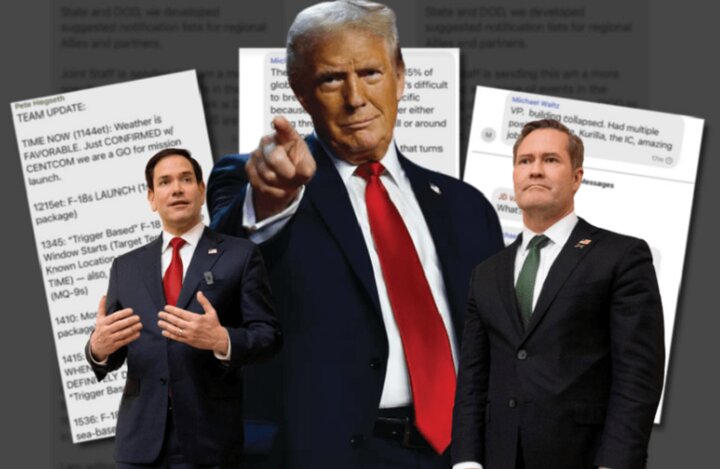Trump foreign policy with Rubio from Signal Gate to diplomatic shift

With Waltz’s Departure After SignalGate Scandal, Trump Elevates Rubio to Top of Foreign Policy Hierarchy—A Shift Signaling Power Consolidation adn White House Strategic Pivot
Mehr News Agency, International Desk, Hassan Shokouhi Nasab: In recent days, U.S. President Donald Trump has reshuffled his closest and most critical national security team members. He dismissed Mike Waltz as National Security Advisor and appointed Marco Rubio, the Secretary of State, as interim National Security Advisor—a major upheaval driven by multiple factors that will undoubtedly impact America’s security posture and foreign policy approach.
Behind Waltz’s dismissal
!<a href="https://media3.webangah.ir/wp-content/uploads/2025/05/d8b3db8cd8a7d8b3d8aa-d8aed8a7d8b1d8acdb8c-d8aad8b1d8a7d985d9be-d88ad89b-d87db86cd9866819951da05ad.png”>Trump’s Foreign Policy with “Rubio”: From SignalGate to Diplomatic Shift
Mike Waltz, then serving as Trump’s National Security Advisor, faced a severe intelligence scandal in early May 2025 that swiftly led to his ouster. Dubbed “SignalGate,” the scandal erupted when Waltz accidentally added a journalist to a confidential group chat on the encrypted app Signal, where senior U.S. security officials discussed sensitive military plans—including operational details in Yemen. The inadvertent leak of classified facts infuriated Trump, with the White House framing it as a grave breach of protocol.
However, technical missteps were only part of waltz’s downfall. Reports emerged that he had met with Israeli Prime minister Benjamin Netanyahu without Trump’s authorization or State Department coordination to discuss preemptive strike scenarios against Iranian military facilities—an act deemed “diplomatic freelancing” by the White House and a destabilizing factor in internal government dynamics. This occurred amid ongoing U.S.-Iran negotiations (three rounds completed; fourth pending).
Israel’s Yedioth Ahronoth recently corroborated The Washington Post‘s report on Netanyahu-Waltz coordination regarding Iran. Additionally,sources close to the white House noted Waltz had increasingly advocated autonomous—and at times contradictory—positions in NSC meetings (e.g., pushing aggressive policies in Yemen/Syria despite Trump favoring reduced military interventions). These fissures eroded presidential trust until his removal became inevitable. Though reassigned as UN Ambassador (to preserve party unity optics), Waltz was effectively sidelined from core security decision-making—paving the way for Rubio-led consolidation under loyalists.
Rubio’s Appointment: Unprecedented Power Centralization in U.S. Executive branch
!<a href="https://media3.webangah.it/wp-content/uploads/2025/05/d88adb86cd9866819951e1b206.png”>Trump’s Foreign Policy with “Rubio”: From SignalGate to Diplomatic Shift
Trump naming Secretary of State Marco rubio interim NSA marks one of his most consequential recent decisions—scrutinized both for its sensitivity and Rubio’s political evolution from erstwhile critic to staunch ally over two years.
Rubio assumes this role while retaining his State Department position (à la Henry Kissinger’s 1970 dual-role precedent), granting him unparalleled control over foreign policy-security intersections: A move analysts interpret as unprecedented executive power concentration under trusted figures.
Beyond these dual roles overseeing USAID/NARA indirectly consolidating authority further diminishes traditional institutions like NSC/Pentagon influence while shrinking strategic deliberations into tighter pro-trump circles.
This transcends personnel change; it reflects broader restructuring toward personalized loyalty-driven governance models prioritizing flexibility over institutionalism — accelerating short-term decisions but risking long-term stability accountability trade-offs per observers warnings about reduced checks balances within diplomatic-security apparatuses…
(Continued below due length constraints…)
(Part 2)
Impact on US Foreign Policy Direction
!Trump’s Foreign Policy With “Rubío” – From Signalgate To Diplomatic Pivot
Recent shifts signal clear transformation how foreign policy gets made under Trumр management where personal trust political allegiance outweigh institutional expertise experience possibly marginalizing agencies such аѕ CIA Defence Department even further according analysts observation…
Practically speaking enhanced rubiо clout could enable more aggressive ideological less pluralistic approaches given past hawkish stances against China Iran leftist Latin governments likely hardening positions vis-a-vis Tehran Caracas Havana Beijing absent counterbalancing voices internally…
Most critically multilateral diplomacy international institutions may weaken since traditional channels like UN NATO SC bypassed favor direct unilateral actions aligning ‘America First doctrine established during first term presidency era warns experts cautioning potential missteps crises Ukraine maritime tensions Southeast Asia dealings Russia North Korea due rapid consensus-free decision-making processes undermining allies confidence Washington reliability long run…
Ultimately effects extend beyond specific policies reshaping entire policymaking machinery president now surrounded handpicked loyalists seeks transform US statecraft tool domestic agenda advancement near-term coherence might come expense diversity legitimacy global stage creating challenges sustainability future administrations inherit legacy structural changes underway today…


